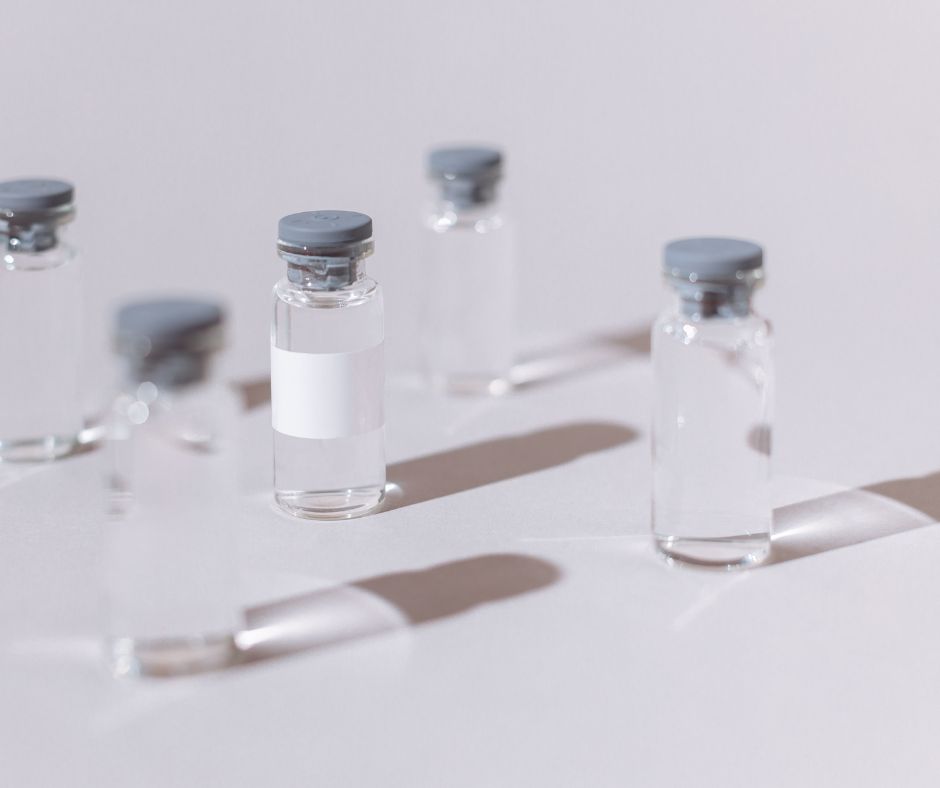Women of a certain age will be all too familiar with the unpleasant symptoms that come with the depletion of hormones as they approach menopause. However, these symptoms are not exclusive to women. Men over 40 may also experience the tell-tale signs of a reduction in hormone levels, including lack of sex drive, night sweats, and hot flushes. This is where hormone replacement therapy (HRT) comes into the picture.
Hormone replacement therapy has been around for decades to treat symptoms of menopause, but what is it, and what does it do? And are there any alternatives to traditional HRT? Read on to find out.
What is HRT?
Hormone Replacement Therapy, or HRT, is commonly used to treat symptoms of menopause. It contains the female hormone estrogen to replace the estrogen that your body has stopped making due to menopause. In addition to estrogen, you will also take progestogen to balance your estrogen levels.
The reason for this is because if you exclusively take estrogen, the lining of the uterus can get over-stimulated, which can increase your risk of developing endometrial cancer. However, women who have had their uterus removed through a hysterectomy only need to take estrogen.
HRT comes in several forms. Many women prefer to use a patch, but it can also be administered in a pill, cream, gel, ring, or spray, depending on your preferred method of taking it. This is often dependant on your symptoms. Suppose you are experiencing uncomfortable vaginal dryness or pain during sex. In that case, you may be prescribed a cream or even have a vaginal ring inserted which will deliver estrogen to the vagina in a more direct way.
With regards to ingredients, HRT is typically made from the urine of pregnant horses, in addition to other synthetic hormones. Ingredients vary from brand to brand, as do the levels of the dose.
Is Bioidentical Hormone Replacement Therapy the Same Thing?
Bioidentical Hormone Replacement Therapy (BHRT) may appear on the surface to be pretty much the same as HRT, but there are some critical differences. The first significant difference is the ingredients. Whereas HRT consists of synthetic hormones, bioidentical hormones are artificial hormones made from plant estrogens and are chemically identical to the human body’s hormones.
Bioidentical hormones can replicate estrogen, progesterone, and testosterone. HRT primarily replicates estrogen and progesterone, limiting its usefulness for men seeking treatment for hormone-related health complaints. BHRT, however, is suitable for men seeking testosterone replacement therapy.
Bioidentical hormones are made by drug companies but can also be produced by a pharmacist who can adjust the hormone levels depending on what that individual patient requires (as instructed by a doctor, of course!).
The other main difference is that BHRT is widely used by both men and women, whereas HRT is most commonly prescribed to women (although not exclusively).
BHRT proponents consider it to be a more ‘natural’ form of hormone replacement therapy and that it is therefore safer.
Who is BHRT For?
As just described, BHRT is suitable for both men and women to treat the symptoms of age-related hormone deficiencies. However, its uses don’t stop there. It has also been used to successfully treat conditions such as fibromyalgia and osteoporosis and ease cancer treatment symptoms such as incontinence and insomnia.
What are the Benefits of BHRT?
The benefits of BHRT are numerous for both women and men. Let’s take a closer look.
Women
The benefits of BHRT for menopausal women are well documented. It is incredibly effective in treating the common symptoms of menopause, including:
- hot flushes
- night sweats
- vaginal itching
- dryness and discomfort during intercourse.
What is less well known is BHRT’s effectiveness in treating other age-related conditions. One of them is osteoporosis, a bone-thinning disease that can increase the likelihood of suffering fractures and broken bones.
For women who have experienced early menopause, have had their ovaries removed before the age of 45, or have an estrogen deficiency, taking BHRT could reduce the risk of developing age-related conditions related to decreased hormones such as:
- dementia
- heart disease
- stroke
- and mood swings.
Men
Although the benefits of BHRT for women are well known, the benefits for men are less so. This is surprising as there are as many benefits to taking BHRT for men as there are for women.
The levels of hormones decline in men in much the same way as women and with very similar symptoms. Men who experience a testosterone deficiency may experience hot flushes, mood swings, and night sweats as they get older. These symptoms may also be accompanied by a decrease in sex drive and a lack of energy and stamina.
Other aging testosterone deficiency symptoms in men include hair loss, erectile dysfunction, memory loss, weight gain, and muscle mass decrease.
It is also worth mentioning that men who suffer from pre-existing health conditions such as high blood pressure, heart disease, or diabetes may experience a more drastic decline in testosterone levels and more noticeable symptoms.
Taking a testosterone replacement rebalances the body’s hormone levels:
- increasing energy
- reducing body fat
- increasing muscle strength
- and boosting sexual performance.
Rebalancing hormone levels could also reduce the risk of heart attack and stroke, improve bone density, and even improve Alzheimer’s and Dementia symptoms.
What are the Side Effects of BHRT?
Although the benefits of BHRT are generally considered to outweigh the risks, it is nevertheless essential to assess the risk factors and side effects.
Women
Studies have shown that for women taking the estrogen-progesterone form of BHRT, there may be a slight increase in the risk of developing conditions such as breast cancer, heart disease, blood clots, and stroke. However, these risks lessen if BHRT is started before 60 or less than ten years after the onset of menopause.
Suppose there is a family history of cancer, heart disease, stroke, liver disease, or osteoporosis. In that case, those factors will be considered when weighing up the best kind of BHRT to take or whether BHRT is suitable at all.
BHRT risks are also dependant on whether you are prescribed the estrogen-only form or the estrogen-progesterone form. The estrogen-progesterone form has been linked to a slight increase in the risk of developing breast cancer, although the risk is thought to be minimal.
Aside from these risk factors, other side effects may be experienced when embarking on a course of BHRT. These include breast tenderness, bloating, fluid retention, nausea and indigestion, and leg cramps. Typically, these side effects will not last any longer than 6-8 weeks, and if they go on for longer than that, your doctor may adjust your dose or prescribe you a different form.
Men
The risk factors and side effects for men taking testosterone therapy are fewer than those for women.
An excess in testosterone can lead to an increase in blood pressure and impair kidney function. So, it is important to monitor testosterone levels carefully before embarking on treatment. Still, the amount that patients receive when starting a BHRT course balances your levels rather than increasing them to an excessive and damaging point.
The primary side effect that may be a cause for concern for some is its potential effect on the prostate. Testosterone therapy may stimulate prostate tissue, which can cause side effects such as urination issues and an increased risk of developing prostate abnormalities. Close monitoring of the prostate is necessary before and during testosterone treatment.
Other side effects may include acne, fluid retention, and a slightly increased risk of blood clots.
Men with low testosterone are more than twice as likely to die from heart disease and cancer, especially if they are overweight, have a sedentary lifestyle, or smoke. Although the long-term risks of testosterone treatment have yet to be fully understood, the benefits appear to outweigh the risks.
Hormone Therapy Studies
We have created a list of helpful resources and clinical studies further to understand the benefits and side effects of BHRT.
How Long Does BHRT Take?
Once you have started on a BHRT course, you will most likely begin to feel some benefits after as little as a few weeks. However, there may be some side effects to contend with during this time as well. It can take up to three months to feel the full impact, by which time any side-effects will have worn off.
There is no limit to how long you can take BHRT. For women, the course length will be determined by when the symptoms of menopause decrease, which could be a few years. Stopping gradually is recommended as if you stop suddenly, it can cause symptoms to return temporarily.
For men taking testosterone, the initial improvements such as easing depression may be apparent after as little as four weeks. Improvement in erectile dysfunction can take as long as six months, and gain in muscle mass, improvement in bone density, and weight loss may take six months or more.
There is no time frame for how long you can take testosterone replacement therapy, but your doctor will advise you on your best path of action.
How Do I Get the Treatment?
You can get BHRT treatment by going to your doctor and explaining your symptoms. Doctors do not always consider it necessary to undertake blood tests before prescribing BHRT, and an explanation of the types of BHRT available is usually regarded as sufficient. Your risk factors will also be considered (family history of heart disease, whether you smoke or are overweight, etc.) when deciding which form of BHRT is most suitable.
However, there is another way! Although many people are reluctant to buy medication online, EVOLVE Telemedicine provides a comprehensive, sympathetic, and user-friendly alternative to going to the doctor for BHRT.
Run by doctors who specialize in BHRT, EVOLVE offers a fully customized service so you can be sure you are getting precisely the right course of BHRT for your particular symptoms.
When you embark on treatment with EVOLVE, you will first be asked about your health history, symptoms, and what goals you are hoping for from your treatment. You will then get some lab work done locally, which will subsequently be assessed by a doctor.
Your results will then be reviewed with you, and you will have the opportunity to ask any questions you have about treatment. The best course of treatment will be explained to you, and a customized treatment plan will be drawn up. Voila! Your medication will then be with you within a few days, and you can start to enjoy the new lease of life that your treatment will hopefully bring.
How Much Does It Cost?
BHRT typically costs between $30 -$90 per month. The cost will depend on the chosen treatment method (patch, pill, cream, etc.) and the level of hormones that you require. Your medical insurance usually covers BHRT, but it depends on what kind of coverage you have, so be sure to check your insurance details before committing to a course of treatment.
BHRT by EVOLVE
With EVOLVE, your initial cost will be around $500, but for that, you will receive a comprehensive medical assessment and lab work to start your treatment. You can then rest assured that you are receiving precisely the right balance of hormones for you. All this and your medication will be delivered straight to your door! What is not to like?
There is no doubt that hormone imbalance symptoms can be annoying at best and, at worst, debilitating. Symptoms such as hot flushes and loss of sex drive can affect your enjoyment and quality of life and lead to depression and anxiety.
Taking BHRT to relieve the myriad of symptoms that people experience due to a hormone imbalance can be life-changing and has never been easier. As long as you bear in mind your risk factors and ensure that you are taking the correct hormones, there is no reason why you can’t enjoy the vast benefits that hormone therapy can provide for men and women alike.
Find out more about how hormone treatment could change your life, and schedule a call with Patient Care @EVOLVE today!






